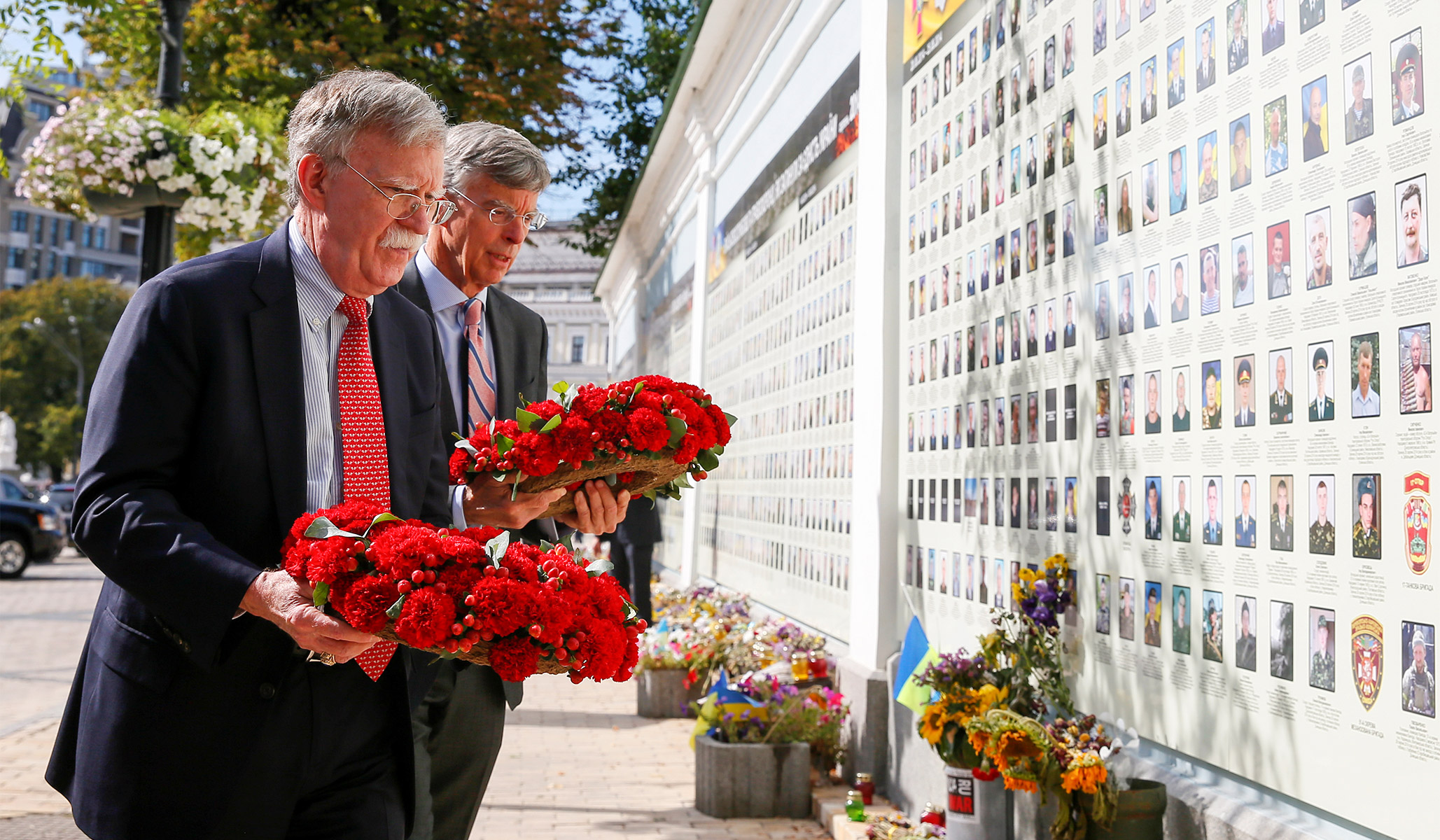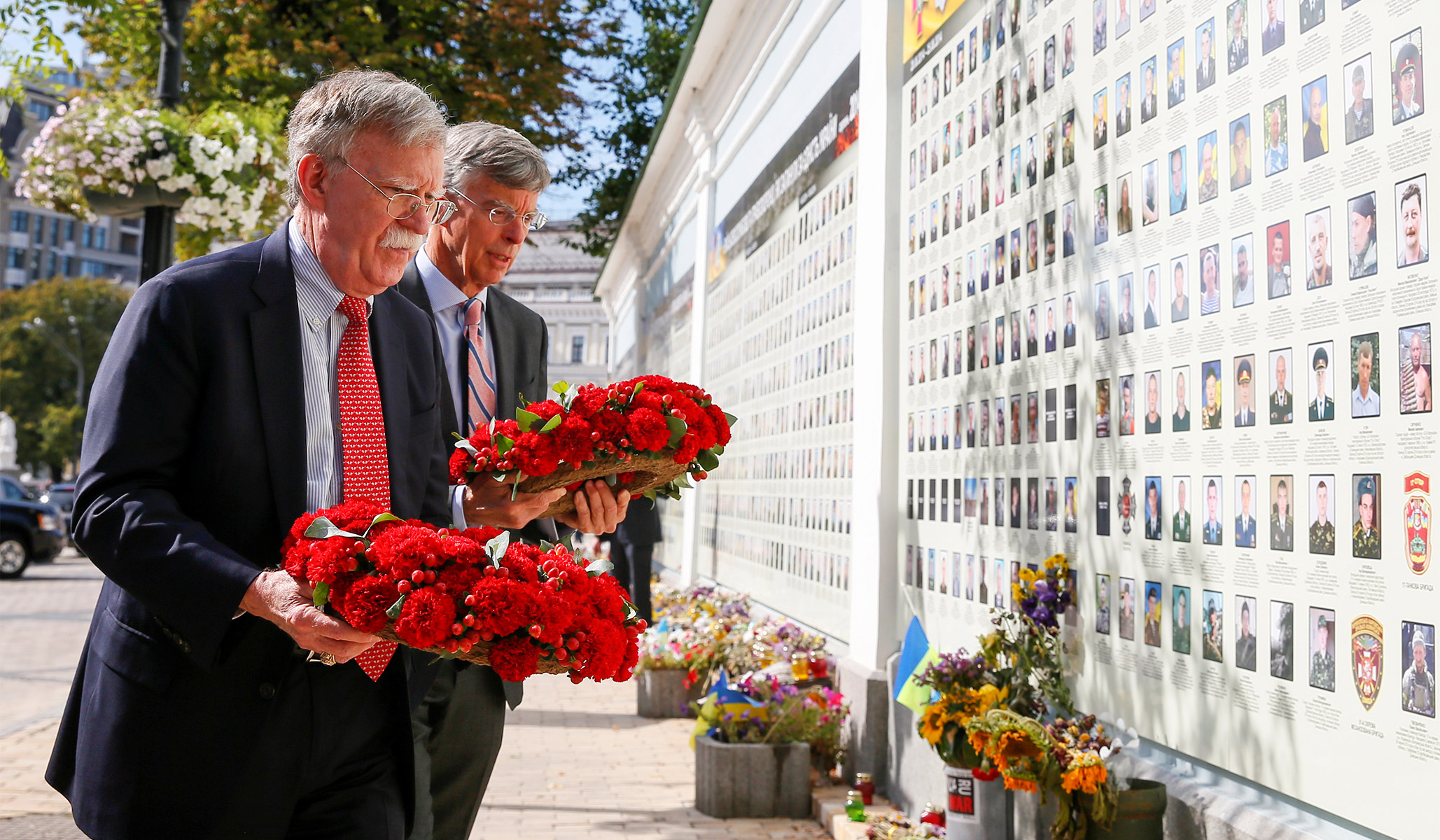
I would like to offer some links to podcasts. Here is a Q&A with Walter Wolf, an old friend of mine, who has written a very helpful book on a terribly important subject: The Right Rehab: A Guide to Addiction and Mental Illness Recovery When Crisis Hits Your Family. Here is a music podcast — an episode of my Music for a While — which begins with a dance from The Nutcracker. This ballet has been canceled in Berlin, you know. (I wrote about it in this column.) Racially and ethnically offensive (they claim).
Here is another Q&A, which is with John Bolton. We talk about Ukraine. Vladimir Putin’s Russia is massing along that border. Ukraine is under dire threat — further threat. “We are potentially days away,” says Bolton, from a Russian action that may result in the effective partition of Ukraine.
For Putin, says Bolton, Ukraine is part of a “comprehensive strategy” aiming to reconstitute some of the Soviet Union. In the crosshairs are six countries that form a “gray zone” between NATO’s eastern border and Russia’s western: Belarus, Moldova, Georgia, Armenia, Azerbaijan, and, of course, the juiciest target, Ukraine. Bolton wrote about this in an article about a week ago, here.
In our podcast, I throw at Bolton some of the things you hear: “Don’t poke the bear.” “Isn’t Ukraine in Russia’s ‘sphere of influence’?” “Is Ukraine really separate from Russia anyway — its own nation?” “Don’t the people in eastern Ukraine want to be with Russia?” “Doesn’t Russia have a right to Crimea?”
Some more: “In 2014, the Obama administration engineered a coup. It overthrew a legitimately elected president, Viktor Yanukovych. We Americans are responsible for the deaths in the Maidan revolution. Because we interfered in Ukraine, we have no right to tell Russia not to interfere. Moreover, our interference caused Putin to annex Crimea and launch his war in the Donbass. It’s on our hands, actually.”
And so on and so forth.
Bolton and I also discuss, “What can the United States, and the West generally, do? What steps can we take, to deter Russia?” “If Russia moves against Ukraine, what will the effect be elsewhere? In the Baltic states, for example? How about faraway Taiwan?” In brief, “Why does Ukraine matter?” (It matters, needless to say — or is it? — to Ukrainians. How about to the rest of us?)
Bolton says that the resolve and credibility of the United States is on the line. We left Afghanistan in disastrous, ignoble, horrifying fashion. This and other things make dictators — in Moscow and Beijing, prominently — lick their chops.
As Bolton notes, Russia and China have been cooperating for the past many years — in military exercises, not least. Ukraine and Taiwan have much in common: as nations trying to hold on to their independence and sovereignty against hungry, empire-minded dictatorships in whose shadow they live. Ukraine and Taiwan are offenses unto the bigger powers that want to gobble them. To those powers, they represent grievances. Sore spots. Embarrassments. Insults to pride.
In an article last week, Nicholas Dujmovic, a friend of mine who is an ex-CIA man and now teaches at Catholic University, brought up a scenario to make one gulp: What if Russia invades Ukraine, and China invades Taiwan, simultaneously?
I myself noted something in a column — smallish, maybe, but possibly important in a symbolic way: The Russian and Chinese ambassadors to the United States teamed up to write an article decrying the upcoming U.S.-led democracy summit.
In a different column, I made a point about nationalists — nationalists in America and elsewhere in the West. Many of them are disdainful of Ukrainian nationhood. (Not all of them are this way, mind you.) Ukraine ought to be right up their alley — but no. Some are openly pro-Putin; others are anti-anti-Putin, you could say.
Bolton points out that some of these guys have “an affinity for Russian nationalism, and too bad for the little countries on their borders.”
I think back to Diane James, the UKIP leader — who cited Putin as one of her heroes. “I admire him from the point of view that he’s standing up for his country,” she said. “He is very nationalist. He is a very strong leader. He is putting Russia first.”
I think of Matteo Salvini, the leader of the League in Italy. His party started a “Friends of Putin” group in parliament. Then they signed a “friendship and cooperation” agreement with Putin. Salvini himself wore a Putin T-shirt in Moscow — a shirt showing Putin in a heroic pose. These guys are very open. They don’t sneak around.
Neither does Éric Zemmour, the presidential candidate in France, who is attempting to out–Le Pen the Le Pens. He is for the renunciation of his country’s alliances with the United States, Britain, and Germany. He wishes to “join hands with Russia” instead.
Whether Ukraine will make it — whether it will be able to fend off Russia and retain its nationhood — I don’t know. It seems to me its enemies are strong, its supporters are few — and everyone else is indifferent. But Ukraine is a gut-check for the West. Would you bet on the West? You may have more confidence than I.
Two years ago, I published a piece called “Ukraine and Us: A report from an anxious capital.” Let me paste a portion here:
Vitaly Portnikov [a leading journalist in Ukraine] makes an ominous statement. The “post-Soviet space” is “pregnant with war,” he says. Bismarck and others spoke of the Balkans as “the powder keg of Europe.” Here is another one, possibly. The United States and other democratic nations should do all they can to uphold the international order and the rule of law. Big powers should not be allowed to invade smaller powers and rearrange borders. This is a recipe for disaster. Adventurism, unchecked, will spread. The world has seen it before, to its horror.
“Have no illusion,” Portnikov says, that “if you give something to Russia, if you placate Russia, this will all calm down.” That would be a “great mistake.”
Again, for my podcast with John Bolton, on this multi-layered and tense subject, go here.

